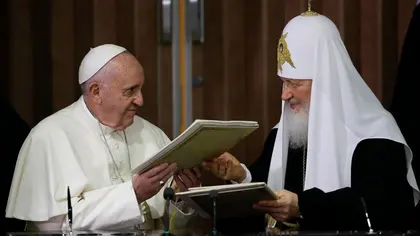With Pope Francis mulling a visit to Kyiv, an idea he floated back in April, concerns are growing as to both the appropriateness of this move as well as the itinerary.
According to the European Pravda’s editor Yuriy Panchenko, a high-profile representative of Ukrainian civil society, Kyiv should reject the idea of hosting the Pope due to what is seen as his deliberate moral equivocation about Russia’s war on Ukraine.
JOIN US ON TELEGRAM
Follow our coverage of the war on the @Kyivpost_official.
To substantiate his argument, Panchenko points to the Pope’s statements made on Ukraine’s Independence Day that both sides bear the blame for the war and that Dariya Dugina, the daughter of the far-right Russian imperialist “philosopher” Alexander Dugin who openly supported the invasion, is an innocent victim. She fully endorsed his views and recently was perhaps even more outspoken as a Russian chauvinist.
“The Pope’s unfriendly statements were at first perceived as a result of the Pontiff’s insufficient knowledge of the Russia-Ukraine’s conflict beginnings and development. To fix that, Ukrainian Catholic representatives traveled to the Vatican and managed to talk to him.
The Pope reportedly showed interest, asked questions, and thanked for them the information — only to make more scandalous statements subsequently,” Panchenko writes.
Accordingly, he argues the Pope’s visit to Ukraine would do more harm than good.
On Aug. 26 the Ministry of Foreign Affairs of Ukraine invited the Apostolic nuncio to Ukraine, Archbishop Visvaldas Kulbokas, to inform him of the disappointment with the Pope’s statement aDugina.

How AI Is Changing, Jeopardizing Narratives About Ukraine
“Visvaldas Kulbokas was informed that Ukraine is deeply disappointed with the words of the Pontiff, who unfairly equate the aggressor and the victim. At the same time, the decision of Pope Francis to mention in the context of the Russian-Ukrainian war the death of a Russian citizen on the territory of Russia, to which Ukraine has nothing to do, causes misunderstanding,” the press service of the Ministry of Foreign Affairs reported.
The Ukrainian Foreign Ministry noted that since the beginning of Russia’s full-scale invasion of Ukraine, the Pontiff has never paid special attention to specific victims of the war, among whom 376 Ukrainian children have already died at the hands of Russian occupiers.
“The Ukrainian Foreign Ministry expressed the hope that in the future the Holy See will avoid unfair statements that cause disappointment in Ukrainian society,” the message said.
Moreover, the situation is even more comlex. Despite the open support that continues to be drummed up by Patriarch Kirill, the Patriarch of the Russian Orthodox Church, for the demonization of Ukrainians and the barbaric military attack on them, Pope Francis has publicly sought to remain on good terms with himand continue “dialogue” instead of condemning his anti-religious and anti-Christian stance.
The Pope’s behavior is therefore increasingly seen as offensive and incomprehensible by many Ukrainians and has provoked posts on social media mocking him and treating his comments on subjects like the Russian war crimes in Bucha and Vinnystia as hollow.
His attitude has placed the Ukrainian Catholic Church, outnumbred by Ukrainian Orthodox Christians, in an uncomfortable situation. Ukrainian Catholic Archbishop Borys Gudziak has just said that while Pope Francis is still likely to visit Ukraine – for it to be “memorable and effective,” it must be properly prepared.
“My advice to the Pope is, be with the victim right now, as soon as possible, and be careful about being seen associating, fraternizing, with the victimizer,” Archbishop Gudziak wrote.
You can also highlight the text and press Ctrl + Enter










